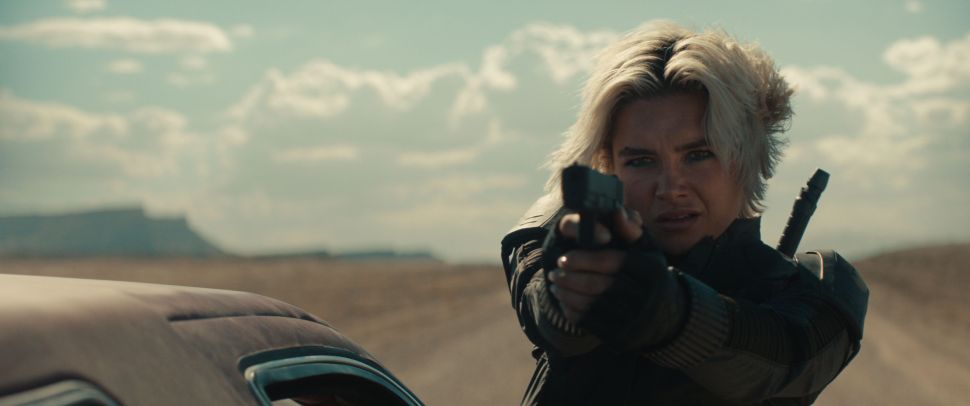For years, critics and fans have been denouncing the “woman problem” in the Marvel Cinematic Universe. From early on, the female characters have been ill-defined and sidelined by the more powerful male characters, despite efforts to fix that as the movies and TV series expanded with new characters and new storylines. The studio, helmed by Disney, released 21 movies before there was even one led by a female hero, 2019’s Captain Marvel, and that film was bludgeoned by negative, misogynistic reactions online. Many of the notable onscreen women, from Scarlett Johansson’s Black Widow to Zoe Saldaña’s Gamora to Elizabeth Olsen’s Scarlet Witch, have been sacrificed to narrative conceits that allowed male characters to flourish.
As a fan and longtime viewer, it’s been exhausting to witness. When Johansson was introduced in 2010’s Iron Man 2, it came with a lot of hair flips and skin-tight body suits. She was eye candy, clearly, despite the character having impressive skills of her own. Marvel attempted to rectify the portrayal in subsequent films, allowing Johansson to do more than just pose in The Avengers and Captain America: Civil War. But it wasn’t until Cate Shortland’s unfairly-maligned 2021 spin-off Black Widow that Natasha Romanoff was treated as an equal onscreen character. It was also that film that introduced Yelena Belova (Florence Pugh), the unabashed protagonist of Thunderbolts*, in theaters this week.
There was an audible sigh of relief from female viewers when both Natasha and Yelena were presented with their hair pulled back and their clothes functional in Black Widow—a clear indication that someone behind the scene was actually thinking about how a woman might dress while fighting. It was a small aesthetic detail that spoke volumes, lending the Marvel Cinematic Universe the female perspective it often lacks. In the years since, Ryan Coogler’s Black Panther: Wakanda Forever and Nia DaCosta’s The Marvels also showcased female heroes who weren’t just there to look pretty.
Now, with Thunderbolts*, we finally get a Marvel movie that doesn’t make the gender of its characters an issue. Directed by Jake Schreier and written by Eric Pearson and Joanna Calo, the film treats all of its characters equally, both in the narrative scope and in a visual sense. Pugh, now with her hair shorn, is an ideal leader as Belova, a complicated woman who quickly admits to be lonely and lost. She’s been tasked by the villainous Valentina Allegra de Fontaine (Julia Louis-Dreyfus) to erase all evidence of wrongdoing, an assignment that leads her into a trap with several fellow anti-heroes. These include Wyatt Russell’s John Walker, Hannah John-Kamen’s Ghost and Lewis Pullman’s Bob, who turns out to be a far more complex character from the comics.
In the film, everyone really goes through it, beaten and scarred and bruised. By the climax, Pugh is coated in a layer of dirt, covered in cuts and sporting a wild mop of hair that would never pass the test of the male gaze. It’s delightful and deeply satisfying to watch. No one’s costume is too tight, no one tries to look hot and there’s a real human sense to these super-human characters, particularly as they grapple with mental health issues that include addiction and depression. One character meets an unfortunate early end, a choice that is slightly problematic because it makes her seem like a throwaway and disrespects the actress playing her, but largely Schreier gives us messy heroes who aren’t defined by anything but their particular characteristics and circumstances.
Marvel is promoting Thunderbolts* as an ensemble film, touting Pugh, Sebastian Stan and David Harbour as the leads. But this is Pugh’s movie. She is an undeniable star, with the impressive ability to bring genuine, tangled emotional depth to a comic book figure. She makes you care about Yelena as a person and the story makes space for that—something Marvel has previously mostly done for its brooding, conflicted male heroes. This movie could be called Yelena, but of course audiences wouldn’t like that and it would also undercut how compelling it is to watch these particular characters team up in unexpected ways.
Still, there’s no mistaking that this is a female-led Marvel movie disguised as something more palatable. Pugh is the new Robert Downey Jr. as far as Thunderbolts* is concerned and it’s refreshing to see how easily she fills that role. The post-credit scene—stay until the very end—promise we’ll get more, as does Pugh’s casting in next year’s Avengers: Doomsday. Let this become the new normal. Let the star of the movie be the talented, compelling actor regardless of gender, and let the protagonist be the most interesting character. It’s a credit to both Marvel and those who conceived Thunderbolts* that we get this small step forward.

